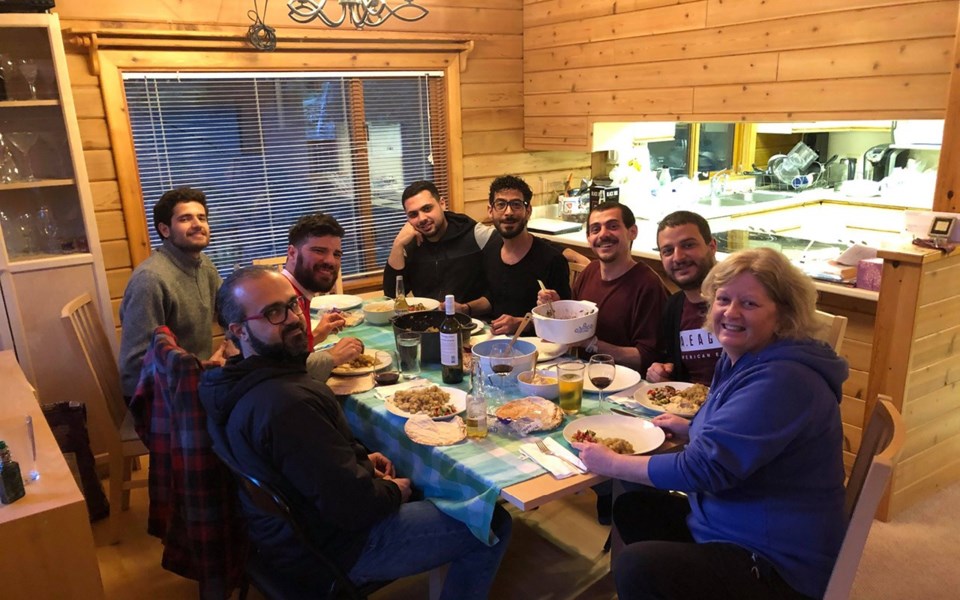Ahmad Fadel Yasen has been in Whistler exactly a month, and like a lot of recent resort arrivals, there are certain things he misses from back home: The food, the culture, his pet cat, named Tiger. But, when you've been given a second chance at life, those creature comforts tend to feel a little less important than they used to.
"The only thing I really miss is my family. The food and the culture, you can live without," said Yasen. "I know it's very hard to live here, it's very expensive—everything is expensive, but for me, it's peaceful. I don't care about anything but to feel safe. It's something you cannot appreciate until you live it."
The 34-year-old Syrian is one of eight refugees in Whistler that have been sponsored by resident Laurie Cooper. (Whistler's first settled refugees, a Syrian family of five, arrived here in 2016 and were sponsored by the Whistler Refugee Response Group.)
A luxury B.C. resort town nestled into the mountains might as well be another planet when compared to war-torn Syria and Afghanistan, where each of the men hail from, but it's been an unlikely haven so far, something that caught even Cooper by surprise.
"I never ever expected the level of success that we've experienced. I didn't anticipate that it would work this well," she said.
A former journalist who was inspired to do her part after volunteering at a crowded refugee camp in Greece, Cooper approached her former employer, the Fairmont Chateau Whistler, more than two years ago to discuss the possibility of securing jobs and accommodation for the refugees. The Fairmont agreed, and today, five of the eight men work in housekeeping at the hotel, with opportunities for advancement.
"We've been really delighted with the program and the guys' level of dedication to the work and getting on with their life and really building something different for themselves," said Fairmont GM Norm Mastalir. (The other men work at Whistler Blackcomb, the Green Lake Station in Rainbow, and in the case of Hassan Al Kontar, who made international news last fall after being stranded in a Malaysian airport for months, he plans to move to Vancouver this week to continue his refugee advocacy work.)
Having the security of a paying job and a place to live has been invaluable to the refugees, but it's the international makeup of the hotel's staff housing—and the resort itself—that has helped them adjust to life here.
"My roommates actually are so nice, so two are from England, one is from India, and all of them are working in Fairmont, so I don't seem like I'm a stranger," said 30-year-old Murhaf Ghaibour, who, like Yasen, spent years after fleeing Syria living as an outsider in Lebanon, sometimes illegally, while awaiting resettlement. "Now I'm living in the staff housing, so everyone came from some place else, so I didn't feel like—how to say?—like I'm in special conditions. I just feel like I'm like everyone here."
Aside from the welcome the community has given them, the refugees' relatively smooth transition can be attributed to Cooper herself. Along with organizing the men's settlement, she has helped raise the funds and in-kind support required by Ottawa to sponsor a refugee, alongside the B.C. Muslim Association and a generous donor from California, a Syrian-American dentist who cut Cooper a cheque for $24,000.
But it's the sense of family she has fostered that has made the refugees feel so at home in a place they would never have been able to find on a map before arriving here.
"It's a weird connection between a mom and a son. I feel the same connection. It's like mom, a spiritual mom. I don't know how to explain it," said Yasen. "When I need anything, when I feel lonely, when I feel any bad feelings, I just call her."
Cooper's work is far from done, however. She has been approached by two other B.C. hotels about hiring refugees, and is now pushing to bring another 10 refugees from persecuted Afghani ethnic group, the Hazara, to Whistler.
It's all part of a tireless effort that Cooper and her "sons of the heart," as she calls the men, hope will shift the public's perception of what a refugee is.
"If I consider myself as a Canadian or from Whistler and I hear (the word) 'refugee,' of course I'm going to have this idea of weak people who need help. But, actually, it's not like that," said Ghaibour. "I would like (people) to see me as an individual, as me."




